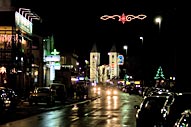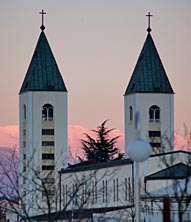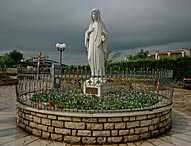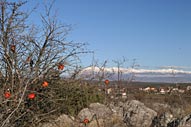date: 12.01.2006.
Fr. Alexis Wiehe, priest of the diocese of Toulon, ordained 1 year and 4 months ago, came on a pilgrimage to Medjugorje in December 2005. The experience of Medjugorje has influenced his life and his vocation. He has the permission of his bishop to incorporate the elements that he received in Medjugorje into his pastoral work.
Can you tell us about the influence that Medjugorje has had on your life and on your vocation?
I am French, but I was born in Mauritius. I left there at the age of 19 to go to Paris for my studies. Previously, from the age of 16 onwards, I walked in faith with the humble and the poor at the school of Mother Teresa. However, I did not have a very solid bond with the Church. I had not managed to understand the Church and to love it. I went to Mass from time to time, and only rarely to confession but never with the heart, and without really understanding the meaning of these sacraments. When I went to France, I was confronted with the modern jungle that is typical of a big capital such as Paris. A time of trial and questioning ensued... after two years in Paris I was in deep despair, so much so that I even contemplated suicide. This idea frightened me so much that I knew that I had to do something... to leave Paris because I was in danger. With my training as a social worker, I thought of going to a third world country with a humanitarian agency. I was strongly attracted to South America and India, but a friend who returned from Medjugorje spoke to me about his experience. I was quite challenged, and when I understood that there was humanitarian work required, I felt that I was really called to Medjugorje. That was in 1996, when I was 21 years of age. This feeling awakened in me an extraordinary hope. I spent 4 months in Medjugorje. I accepted Our Lady’s messages with great joy, and I sought to put them into practice. After this, I was no longer the same person, thanks to this school of Mary. I felt the call to consecrate everything to Mary and to put myself totally at her service. I left with an extraordinary expectation for my life, my vocation, and for the Church. It is thanks to Mary that I discovered the mystery of the Church and felt a deep desire to serve it. At that time, being a priest seemed so awesome to me, while I myself seemed too small, too imperfect, too unworthy to become one... But I received the grace to believe in this call from God.
And so you entered the seminary then?
I first joined the Community of the Beatitudes, because it is there that I found brothers and sisters who lived the messages, whereas in other Church environments I rather encountered a certain mistrust towards Medjugorje. I entered the seminary in 1998. During the first two years, I had the opportunity to accompany pilgrimages to Medjugorje. The call to priesthood was confirmed, but not the call to life in the Community. I knew that I was to be a priest at the school of Mary, the school of Grignon de Montfort, and that I was called to evangelise. I returned to Mauritius, but I did not find a favourable environment there. After 6 months, I understood that I was to forsake my country. It was truly a bleak time. I did not know to whom I should turn. I returned to France in faith, and I went to Mons. Dominique Rey, bishop of Toulon, who had been consecrated Bishop 6 months previously.
Did your bishop know Medjugorje?
He knew prayer groups inspired by Medjugorje and, as a priest, he had visited Medjugorje. He knew that Medjugorje had an important place in my life, and he was always full of good will. One year later, he encouraged me to accompany a group of young people to Medjugorje! This encouragement from the bishop was an extraordinary source of joy for me: I had the desire to rediscover my first call. I returned, deeply convinced that it was necessary to continue to organize trips, and my bishop gave me the green light. During that year, I accompanied three pilgrimages, which bore much fruit. Subsequently I was ordained a deacon. At that time, in 2003, my bishop heard serious criticisms with regard to Medjugorje, and so I returned with another seminarian to Medjugorje to speak with people, in order to ascertain the source of these criticisms. I asked my bishop what I should do. He found that he did not have all the elements for discernment, yet he did not forbid to me to go there. On the contrary, he said to me: “Show me the fruits of Medjugorje!” That was the second exhortation from my bishop which again was a source of hope. To show the fruits in our own diocese: conversions, vocations, unity etc.
Is one pilgrimage to Medjugorje sufficient for the fruits to endure?
This raises the question as to what would facilitate the blossoming of all the graces received when the pilgrimage itself was over: for the Church, in the Church, at the service of the parishes, of prayer groups, of youth etc. Pondering all that in my heart, while journeying to London with the seminarians, I met Robert Toone who in 1990, together with Father Slavko, launched the first gathering of young people, which became the “Youth Festival” in Medjugorje. In England, it became the movement “Youth 2000”. This is a direct fruit of Medjugorje, already integrated into, and at the service of, the local churches. I persuaded myself that this was something to promote and encourage in France. I wondered how to help this movement to develop in France. In Paris, there are prayer groups inspired by Medjugorje, founded by very close friends of mine: the group “Abba”, the“Pilgrims of hope” etc... I am following these developments very closely...
Could you continue to come to Medjugorje after your priestly ordination?
After the ordination, it was time to get to grips with the reality of the diocesan Church, of the parish, of the pastoral work with young people and with students, in which I was immediately immersed. I am a curate in a parish, a university chaplain, and I'm also responsible for the promotion of vocations. This is a lot for a young priest to cope with... A young priest must respond to the concrete reality of his situation: to be at the service of the people and not just at the service of the projects. He must acknowledge the individual, taking the person into account in order to evangelise better, and to support him all the more. It is sometimes very arid: in a parish, everyone is not necessarily open to all that one proposes. My priority is pastoral work among students with the objective of leading them to Mary, so that they follow Jesus in her school. Last year, I came for the first time as a priest, without a very precise pastoral project. This year it is much more structured: I had occasion to take along with me the people who form the student core of my chaplaincy.
What concrete fruits do you see in young people?
Here, the young people experience the love of God, and experience Jesus Christ living today. They experience personal salvation. Some of them had deep wounds which stunted their growth. They experience grace here, the presence of Mary full of grace, and that experience of prayer removes the obstacles. They “surrender”. They agree to let themselves be led by God, and follow Jesus. Here in Medjugorje, they also experience "Church", which is something that touches us priests. They discover that the sacraments of the Church are not mere extras but are real opportunities provided by the Church to encounter Jesus. They discover regular sacramental practice and full communion with the Church. Many young people, after a pilgrimage to Medjugorje, have a great desire to be educated in the authentic teachings of the Catechism of the Church. They want to deepen their faith, and to understand better the faith and the teaching of the Church. I know of some who have joined schools of evangelisation.
How is Mary leading towards the Church?
I am deeply convinced that Medjugorje is a gift for the Church. I experienced it personally. For me, the fruit of Medjugorje was putting myself at the service of the Church. Today, I am a priest of the Church. When I sought to discern my vocation, I listened to what my spiritual father and my bishop said to me. I saw how Mary taught me precisely this obedience to the Church. I saw it in the young people that I accompanied.
Is it the same among all pilgrims?
What I saw and what I can attest to, is that there are people who do beautiful things here, who do receive graces, but who do not always bear fruit in the Church because of the lack of subsequent support or because of the limits of that support. I noticed in Medjugorje, or after the pilgrims returned home, people who made use of this place just to let the young people have a merely charismatic experience, or to lead them to a certain apocalyptic vision of time, while stressing only one particular message. I saw at which point there can be a spoiling of the fruits of Medjugorje, by people who have only this role as guide, and who do not have a properly authentic sense of the Church. The desire that I have as a priest, is to see groups well supported both during and after the pilgrimage by people who are in communion with, and deeply committed to, the Church, and who help other people to follow this path. In important spiritual places like this one, one must retain the spiritual dimension but not at the expense of the loving action of the Church. Belonging to the Church also involves a physical response, which is sometimes very costly. Medjugorje is for the Church.
What could the bishops do to support the fruits of Medjugorje?
They should simply encourage the initiatives of the laypeople and offer them support, so that, after the pilgrimage is over, they can continue to meet and to persevere in fruitfulness.
Did you know Father Slavko?
Yes I did, as a seminarian. I undertook a fasting retreat with him. Father Slavko is a beautiful priestly figure for me, a priestly model.
What is role of Mary in the life of the priest and in the life of the parish?
Vital! What they proposed to us in the seminary on the spiritual level was not enough for me. What they propose to us as priests is not enough for me. I need to have this personal attachment to Mary and to consecrate to Mary each one of my days and each person I meet. Mary will help us to find the “formulas” for the new evangelisation: new methods, a new language, a new zeal. My bishop gives me the means to develop that. Mary chose a parish here, in Medjugorje. The reality of a parish is the community of its faithful. I encourage the parishioners to become aware of the call which they have received.
Is Medjugorje also a possible model for the renewal of a parish?
I am convinced that this is so. If I become pastor one day, I will seek to bring to my parish the elements that I saw here: daily rosary, Eucharist, the Way of Cross. Something is given in Medjugorje for the renewal of all the parishes in the universal Church. The consecration to Mary bears fruit.
I am a young priest who still has much to learn. I am enormously joyful and hopeful for the Church and for the world, and this joy and this hope are each engendered by Mary.
Interview by Lidija Paris



